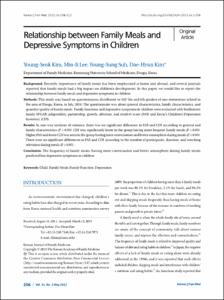KUMEL Repository
1. Journal Papers (연구논문)
1. School of Medicine (의과대학)
Dept. of Family Medicine (가정의학)
Relationship between Family Meals and Depressive Symptoms in Children
- Keimyung Author(s)
- Suh, Young Sung; Kim, Dae Hyun
- Department
- Dept. of Family Medicine (가정의학)
- Journal Title
- Korean Journal of Family Medicine
- Issued Date
- 2013
- Volume
- 34
- Issue
- 3
- Keyword
- Child; Family Meals; Family Function; Depression
- Abstract
- Background: Recently, importance of family meals has been emphasized at home and abroad, and several journals reported that family meals had a big impact on children’s development. In this paper, we would like to report the relationship between family meals and depressive symptoms in children. Methods: This study was based on questionnaires distributed to 162 5th and 6th graders of one elementary school in
the area of Daegu, Korea, in July, 2010. The questionnaire was about general characteristics, family characteristics, and quantity/quality of family meals. Family functions and depressive symptoms in children were evaluated with Smilkstein’s family APGAR (adaptability, partnership, growth, affection, and resolve) score (FAS) and Kovac’s Children’s Depression Inventory (CDI). Results: In one-way analyses of variance, there was no significant difference in FAS and CDI according to general and family characteristics (P > 0.05). CDI was significantly lower in the group having more frequent family meals (P < 0.05). Higher FAS and lower CDI was seen in the group having more conversation and better atmosphere during meals (P < 0.05). There were no significant differences in FAS and CDI according to the number of participants, duration, and watching
television during meals (P > 0.05). Conclusion: The frequency of family meals, having more conversation and better atmosphere during family meals predicted less depressive symptoms in children.
- Publisher
- School of Medicine
- Citation
- Young-Seok Kim et al. (2013). Relationship between Family Meals and Depressive Symptoms in Children. Korean Journal of Family Medicine, 34(3), 206–212. doi: 10.4082/kjfm.2013.34.3.206
- Type
- Article
- ISSN
- 2005-6443
- Appears in Collections:
- 1. School of Medicine (의과대학) > Dept. of Family Medicine (가정의학)
- 파일 목록
-
-
Download
 oak-aaa-03412.pdf
기타 데이터 / 125.29 kB / Adobe PDF
oak-aaa-03412.pdf
기타 데이터 / 125.29 kB / Adobe PDF
-
Items in Repository are protected by copyright, with all rights reserved, unless otherwise indicated.